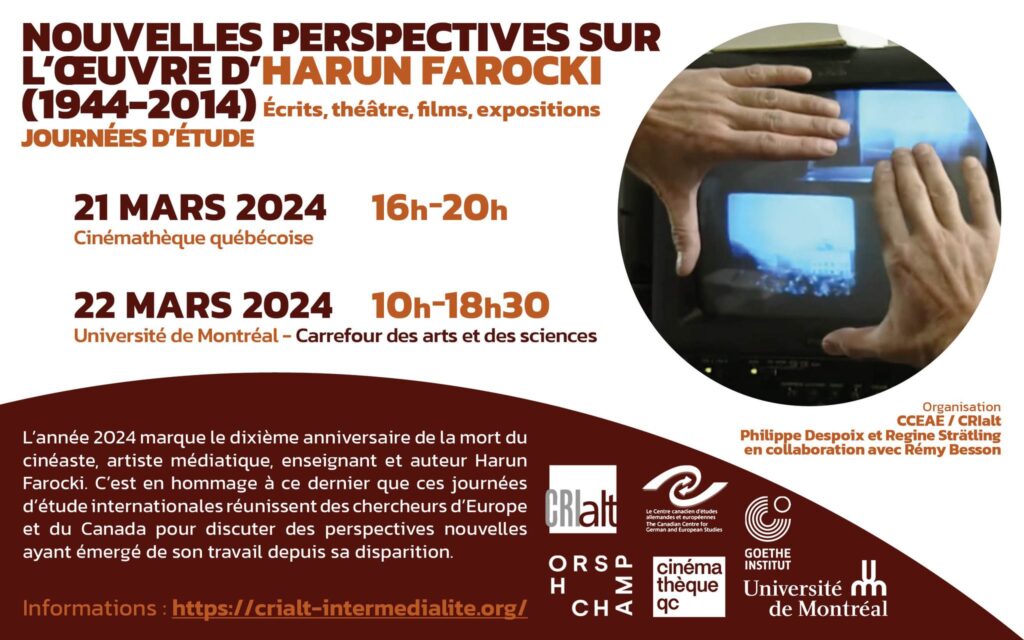The CRIalt research centre is carrying out a vast project, thanks to the support of cinEXmedia, on various political questions around film archives.

Olivier Du Ruisseau
The Centre of Intermedial Research in Arts, Literatures and Technologies (CRIalt), with the support of the cinEXmedia partnership, has obtained a Connection grant from the Social Sciences and Humanities Research Council of Canada, enabling it to carry out a vast project this year. Entitled The Political Use of Film Archives: Contemporary Issues in Documentary Production, the project has two phases. The first, which took place from the fall of 2023 to winter 2024, was devoted in particular to the cinema of Sergei Loznitsa and Harun Farocki. CRIalt will also organize with a dozen institutional partners in the fall of 2024 a series of events on editing practices and on interpreting archival images from an intermedial and decolonial perspective.
The project came out of the initiative of the researchers Rémy Besson and Philippe Despoix, who initially wanted to organize screenings followed by interviews on the topic of the use of archival images in the films of Loznitsa and Farocki. “We began with a screening of films by Loznitsa last fall”, explains Rémy Besson, a research professional and scholarly coordinator of the international research partnership TECHNÈS. “We then wanted to pay tribute to Farocki by reflecting on the present-day relevance of his work and by bringing it into dialogue with contemporary and present-day approaches”.
Marion Froger, CRIalt’s director, who submitted the grant application, remarks that “Rémy and Philippe’s initial idea raised the question of other filmmakers who also pose political questions around the use of archives. We were approaching the thirtieth anniversary of the genocide in Rwanda, and for my part I was thinking, precisely, of ways of addressing archives from a decolonial perspective, including through this event. Because violence in history is not only a matter of wars and genocides, they are also tied to every form of violence connected to colonization. I thus agreed to an event last December related to the genocide in Rwanda, on which I had previously worked, but we quickly realized that many more activities could take place around these questions. This is why we developed a second phase for the fall of 2024”.
Sergei Loznitsa and Harun Farocki
An initial event, Depicting the Jewish Genocide? Thinking about Babi Yar. Context by Sergei Loznitsa, moderated by Rémy Besson, was organized at the Carrefour des arts et des sciences at the Université de Montréal on 7 November 2023. On 5 December, Manon Froger moderated the event Rwandan Genocide: Which Archives?, including clips from films by Luc de Heusch, François Woukoache and Samba Ndiaye. Then on 6 February and 5 March Rémy Besson and Philippe Despoix organized two events around the cinema of the German filmmaker Harun Farocki. This first phase of the CRIalt project then concluded with a program of five screenings of films by Farocki at the Cinémathèque québécoise from 15 to 21 March, and two study days devoted to him on 21 and 22 March at the Carrefour des arts et des sciences.
“Farocki always paid attention to the materiality of the documents he put to use”, Besson explains. “His films also show that he sees cinema at one and the same time as a creative activity and a political gesture, in which archives have a political connotation. He reveals himself, for example by filming his hands, by showing himself editing his film”.
Besson, in the course of his work, examined the short film Respite, made up of images shot by Rudolf Breslauer, a photographer deported to the Westerbork concentration camp during the Second World War. “In this film, Farocki chose to work from a single archival source, to which he did not add sound or colour and which did not slow down”, Besson explains. “Neither does he use the zoom, and he tries to maintain the rhythm of the original archival material. In this film he also explains how this archive was created at the time and how it has come down to us. He thus creates a history of the historic event and of the image itself. This kind of approach is very rare today, in particular in the work of Loznitsa, who makes scripting and editing decisions which are much more aesthetic, without providing information about the provenance of the archive. This is why we wanted to adapt a comparative approach”.
A Dozen Partners
In the fall of 2024 a series of events will be organized by Marion Froger and Claudia Polledri, in collaboration with the researchers Karine Bertrand, James Cisneros and Zaira Zarza. The dates and places of the events will be announced at a later time. We already know, however, that this second phase will consist of four screenings followed by discussions, one of which will be organized in collaboration with Wapikoni Mobile, with an Indigenous filmmaker in attendance. An international conference, entitled “On the Documentary Use of Film Archives: For an Intermedial, Decolonial and Comparative Approach”, is also being planned for 25 and 26 October.
“I was motivated to carry out this project because it brings together the interests of several colleagues with whom I enjoy working”, Froger remarks. “Zaira Zarza, for example, works on Latin American film, while Claudia Polledri and André Habib focus more on the Middle East. We are also interested in what is happening in Africa. And André Habib is keen about the affective dimension of images, as he has developed an entire project on nostalgia and melancholy. For my part, I have worked more on the question of intermediality. In this context, our interest in archives lets us get out of our niches. We study, as broadly as possible, the effects of these images and why they constitute a real creative phenomenon today in all sorts of fields”.
A dozen institutional partners are collaborating on the CRIalt project: the Centre canadien d’études allemandes et européennes, the Goethe-Institut, the Cinémathèque québécoise, the National Film Board of Canada, Wapikoni Mobile, the on-line film magazine Hors champ, Presses de l’Université de Montréal, Amsterdam University Press, Université Paris Cité, the La lumière micro cinema collective, the Groupe de recherche sur l’avènement et la formation des identités médiatiques (GRAFIM) and the cinEXmedia partnership.
“Wapikoni is also in contact with another organization, La boîte rouge, based in Quebec City”, Froger remarks. “With them they will present a carte blanche event in the fall, where there will be a discussion of how archives are used in Indigenous milieux. The La lumière collective also has a modus operandi I quite like, because they invite filmmakers from every part of the world to their venue. They will also help us get out of the university and meet a different audience. We wanted to decentre things a little. And our many partners are especially important in that regard”.
